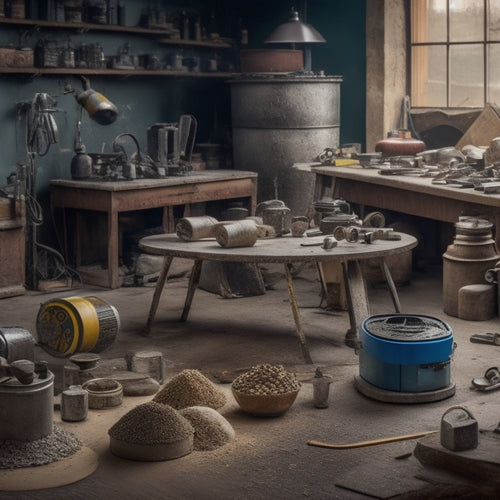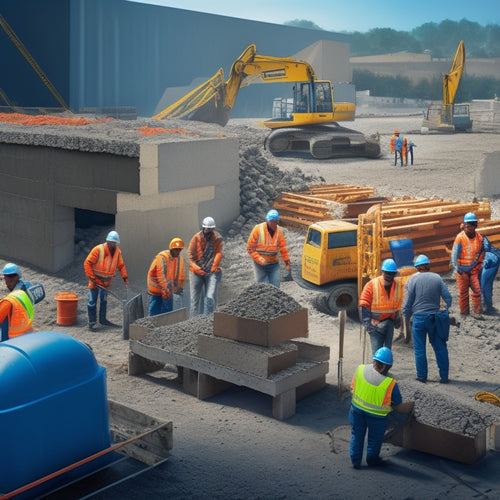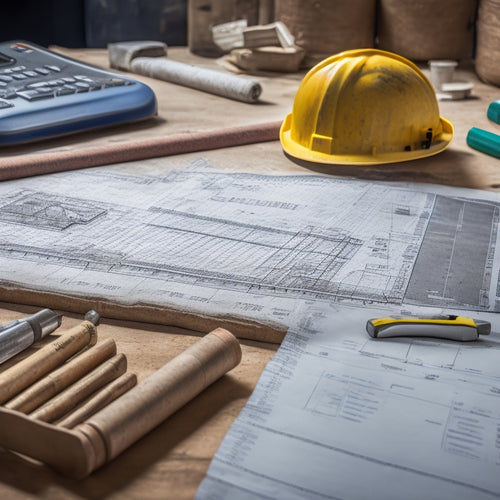
3 Best Essential Concrete Finishing Tools for Beginners
Share
You'll need three essential concrete finishing tools to achieve a professional-looking finish on your first project: a reliable tamping tool, a precise edger, and a versatile float. A tamping tool compacts and levels fresh concrete, ensuring a solid base. An edger creates clean, defined edges and joints, giving your project a polished look. A float smooths and flattens the surface, preparing it for further finishing. With these three tools, you'll be well on your way to achieving a smooth, even finish - and there's more to learn about mastering the art of concrete finishing.
Key Takeaways
• Beginners should prioritize a tamping tool for compacting and leveling fresh concrete to ensure a strong foundation.
• An edger is essential for creating clean edges and joints, giving the concrete a professional finish.
• A float is vital for achieving a smooth, even surface, and is used in combination with other tools for optimal results.
• A trowel is necessary for applying and smoothing finishing compounds, and comes in different types for various tasks.
• A level is a crucial tool for ensuring the concrete surface is perfectly level and even, preventing future problems.
Essential Tools for Finishing Concrete
You'll need a set of essential tools to achieve a smooth, even finish on your concrete project, including a tamping tool, edger, and float. These tools will help you prepare the surface, remove excess concrete, and create a uniform texture.
When it comes to troweling, you'll want to choose from various types of trowels, such as a V-trowel, fresno trowel, or a finishing trowel, each suited for specific finishing techniques. For instance, a V-trowel is ideal for applying a thin layer of concrete, while a fresno trowel is better suited for larger areas.
As you work on your project, you'll need to master different finishing techniques, such as floating, troweling, and edging. Floating involves using a float to smooth out the surface, while troweling requires using a trowel to apply pressure and create a uniform finish. Edging, on the other hand, involves using an edger to create a clean, defined edge.
Selecting the Right Finishing Tools
With a variety of concrete finishing tools available, choosing the right ones for your project requires evaluating factors such as the type of concrete, surface finish desired, and personal comfort.
You'll want to reflect on the specific requirements of your project, such as the size of the area, the thickness of the concrete, and the desired finish.
When it comes to tool selection tips, it's crucial to assess the finishing tool types you'll need.
Will you be working with a smooth, flat surface or a textured, decorative one?
Different tools are designed for specific tasks, such as floatation, tamping, or edging.
For example, a bull float is ideal for large, flat areas, while a hand float is better suited for smaller, more intricate work.
Must-Have Tools for Beginners
Five essential tools will get you started on your concrete finishing journey. You won't need a vast collection of tools to begin, but having the right basics in your toolkit will make a huge difference in the quality of your work. As a beginner, it's vital to focus on building a solid foundation with these must-have tools.
Here are the top tools you'll need to get started:
-
Tamping tool: A must-have for compacting and leveling fresh concrete.
-
Edger: Helps create clean, defined edges and joints.
-
Float: Used for smoothing and flattening the concrete surface.
-
Trowel: Perfect for applying and smoothing finishing compounds.
-
Level: Guarantees your concrete surface is perfectly level and even.
These basic toolkits will help you master beginner techniques and set you up for success in your concrete finishing projects.
Frequently Asked Questions
Can I Use a Regular Trowel for Finishing Concrete?
You're wondering if a regular trowel will cut it for finishing concrete. The truth is, a standard trowel won't give you the desired results.
You'll need a specialized trowel designed for concrete finishing, like a fresno or a pool trowel. These trowels are designed for specific finishing techniques, such as floating and troweling, which require a more precise control over the concrete.
Invest in the right tool to achieve a smooth, professional finish.
Are Concrete Finishing Tools Expensive for Beginners?
Imagine you're standing in a hardware store, surrounded by rows of concrete finishing tools that seem to stretch up to the ceiling.
You're wondering, 'Are these tools going to break the bank?'
The good news is that you don't have to invest in top-of-the-line tools to get started.
Compare costs and look for budget options - you can find decent quality tools for a fraction of the price.
With some savvy shopping, you can get the essentials without blowing your budget.
Do I Need to Clean My Tools After Each Use?
You're wise to ask about cleaning your tools after each use. Proper tool maintenance is essential to extend their lifespan and prevent damage.
You'll want to develop good cleaning techniques, like wiping down metal tools with a wire brush and lubricating moving parts. This habit will save you time and money in the long run.
Make it a routine to clean your tools after each use, and you'll be rewarded with precision and efficiency in your concrete finishing projects.
Can I Finish Concrete Without a Power Trowel?
You're trying to smooth out concrete like a chef whips up a soufflé, but can you do it without a power trowel? Yes, you can!
While a power trowel saves time and effort, you can achieve a smooth finish with manual finishing techniques.
Try using a hand trowel, float, or darby to work the concrete. These power trowel alternatives require more elbow grease, but with practice, you'll master the art of finishing concrete like a pro.
Are There Any Safety Precautions for Using Concrete Finishing Tools?
When working with concrete finishing tools, you'll want to prioritize tool safety to avoid accidents.
Always wear protective gear like gloves, safety glasses, and a dust mask to shield yourself from debris and dust.
Confirm your tools are in good condition, and regularly inspect them for damage.
Additionally, keep your workspace clean and well-lit to prevent tripping hazards and visibility issues.
Conclusion
With your trio of essential concrete finishing tools in hand, you're ready to transform a pour into a polished masterpiece.
As you smooth, float, and finish, imagine your tools as an extension of your own hands, working in harmony to create a surface as slick as glass.
With every stroke, your confidence grows, and your concrete canvas takes shape.
Now, get out there and leave your mark!
Related Posts
-

Top DIY Concrete Grinding and Polishing Tools
When selecting DIY concrete grinding and polishing tools, you'll want to take into account a range of factors to guar...
-

7 Best Tools for Concrete Block Construction
You'll need a solid foundation, precise cutting, and seamless finishing to guarantee your concrete block construction...
-

5 Tips for Accurate Concrete Measurement Tools
To guarantee accurate concrete measurement, you'll want to calibrate your measuring tools regularly, choosing a frequ...


